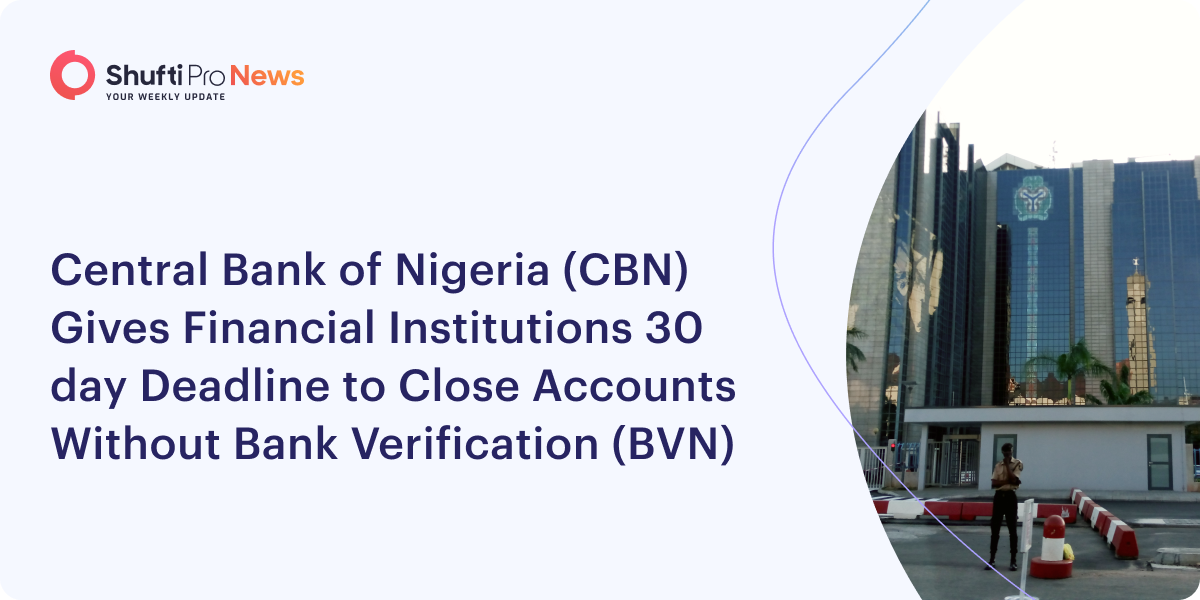Central Bank of Nigeria (CBN) Gives Financial Institutions 30 day Deadline to Close Accounts Without Bank Verification (BVN)

Financial institutions and banks have been given a 30 days notice period by the Central Bank of Nigeria (CBN) to close their accounts without Bank Verification Numbers (BVNs). By April 8, 57.39 million Nigerians had linked their accounts to BVNs, according to the Nigerian Interbank Settlement System (NIBSS).
Accounts without bank verification numbers must be closed within 30 days of the Central Bank of Nigeria’s deadline. According to a review of the ‘Regulatory Framework for Bank Verification Number (BVN) Operations and Watchlist for the Nigerian Banking Industry,’ as well as promoting more effective, safe, and reliable banking and payment processes, this move was prompted by the necessity of an effective Know-Your-Customer (KYC) and Due-Diligence framework.
As a result of the adoption of this policy, BVN operations and watchlist activities conducted by financial institutions in the country will be able to adhere to a set of guidelines to address the increasing rate of fraud in the banking sector, enhance public confidence in the banking sector, whilst also enhancing public confidence within the banking sphere.
The CBN instructed banks to link customers’ BVNs to accounts and wallets associated with their BVNs (except Tier 1) as part of the policy implementation plan. The BVN generated after the customer’s enrollment must be used to link the accounts/wallets to which the customer is a signatory.
“No new account/wallet shall operate without BVN (except inflows). However, any account/wallet without BVN shall be closed within 30 days,” the framework said. Customers’ BVNs are delinked from accounts/wallets by removing the BVNs of any signatory associated with those accounts/wallets (excluding directors and beneficial owners).
On behalf of the CBN, the Chief Audit Executive of the customer’s bank has approved delinking the BVN. “This delinking is for corporate or joint accounts and for activities not associated with breaches. Returns on delinked accounts/wallets (except Tier 1) shall be rendered to the Director, Payments System Management Department on a monthly basis.”. Also stating, “Where there is no linked account, a nil report should be submitted while fraud management is a process aimed at using BVN to deter, prevent, detect and mitigate the risks of fraud in the banking industry.”
It is prohibited for an individual who is listed on the watchlist to establish a new banking relationship. According to the apex bank, if a bank chooses to continue its relationship with an account holder on its watch list, the account holder will not be permitted to utilise e-channels, will not be allowed to issue cheques to third parties, will not be permitted to provide references to other customers, and will not be allowed to access credit facilities or guarantee credit facilities. Moreover, penalties for such individuals will also be applied to their accounts for up to 10 years.
“Once a Watchlisted BVN has served its term on the Watchlist, the Nigerian Interbank Settlement System (NIBSS) shall automatically delist the BVN and notify the stakeholders. Where a bank realised that an individual was placed on the watch list in error, the bank shall apply in writing, with supporting documents, to the Director, Risk Management Department of the CBN, for approval to delist,” stated the XYZ.
The MD/CEO and Chief Audit Executive must sign the documents supporting the request. As soon as CBN has approved the delisting, the bank should forward the approval to NIBSS. Individuals placed on a watch list can only be delisted with the consent of the institution that put them on the list.
CBN oversees BVN operations and systems, as well as other stakeholders’ compliance. Regulatory institutions will receive a Watchlist circular, a Watchlist framework will be reviewed, if necessary, and sanctions will be imposed for noncompliance.
In cooperation with other stakeholders, a review of the Standard Operating Guidelines for the BVN should be initiated by NIBSS as necessary, with approval by CBN. This review should ensure that the BVN system operates smoothly, that the BVN database is maintained, that BVN information is adequately protected and that a Watchlist Portal is maintained online in real-time.
Suggested Read:
REGULATORS EXPRESS CONCERNS ON TD BANK’S AML PRACTICES LEADING TO MERGER TERMINATION TO ACQUIRE FIRST HORIZON BANK











